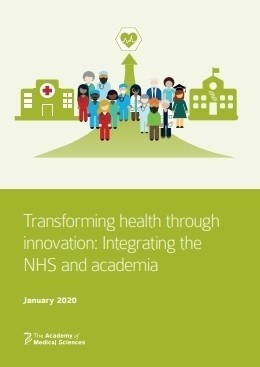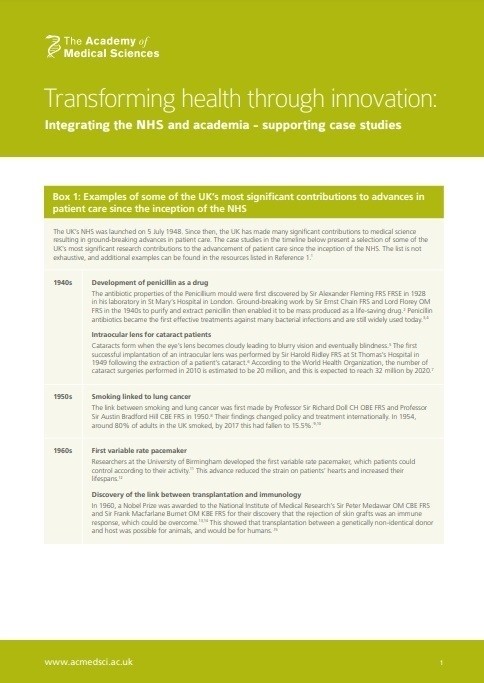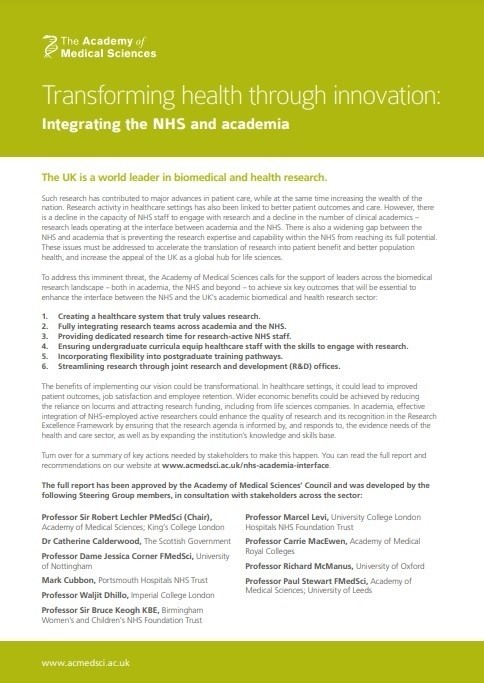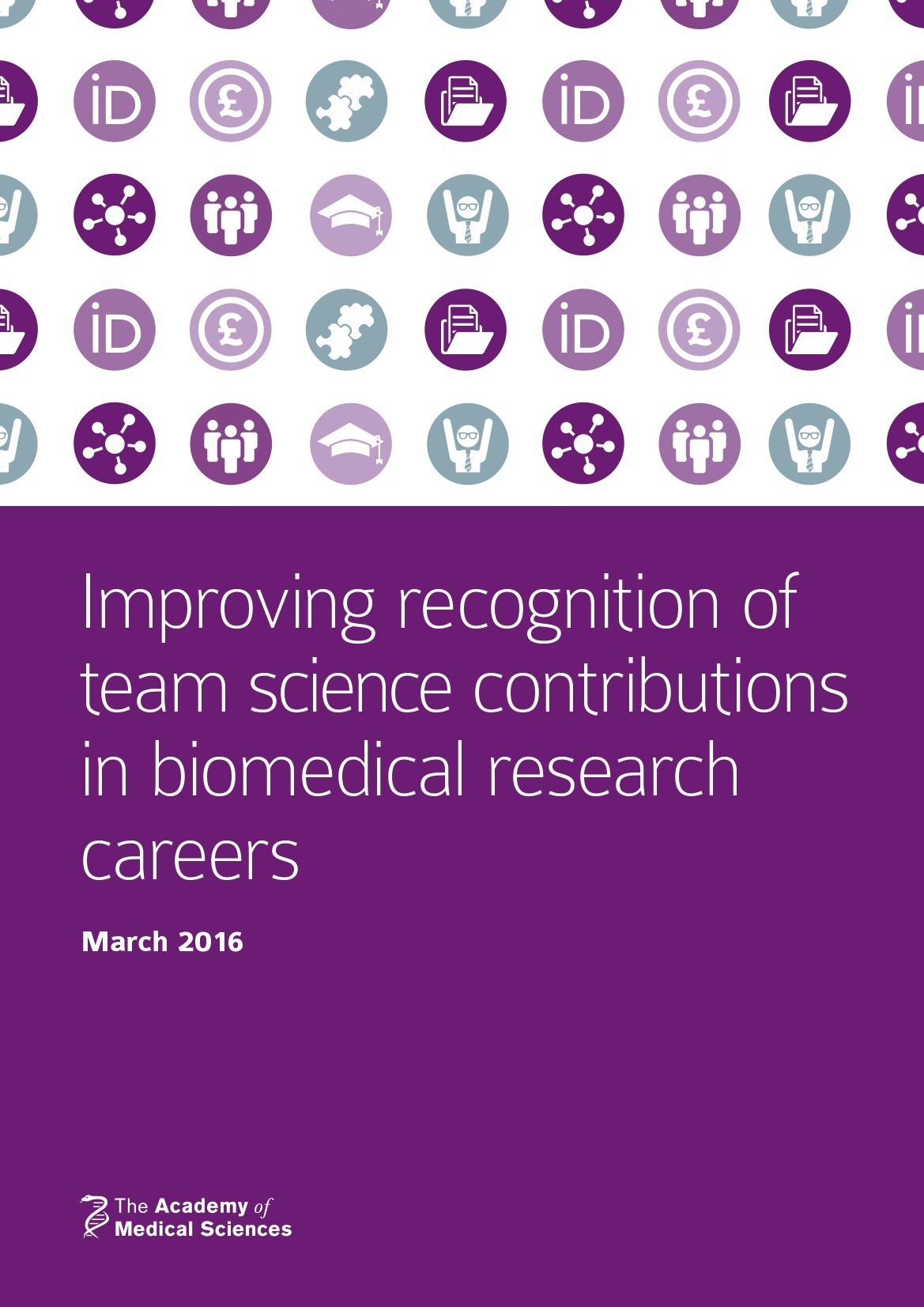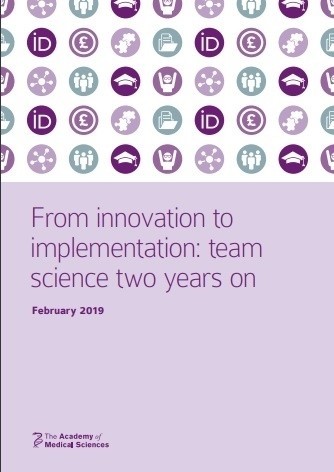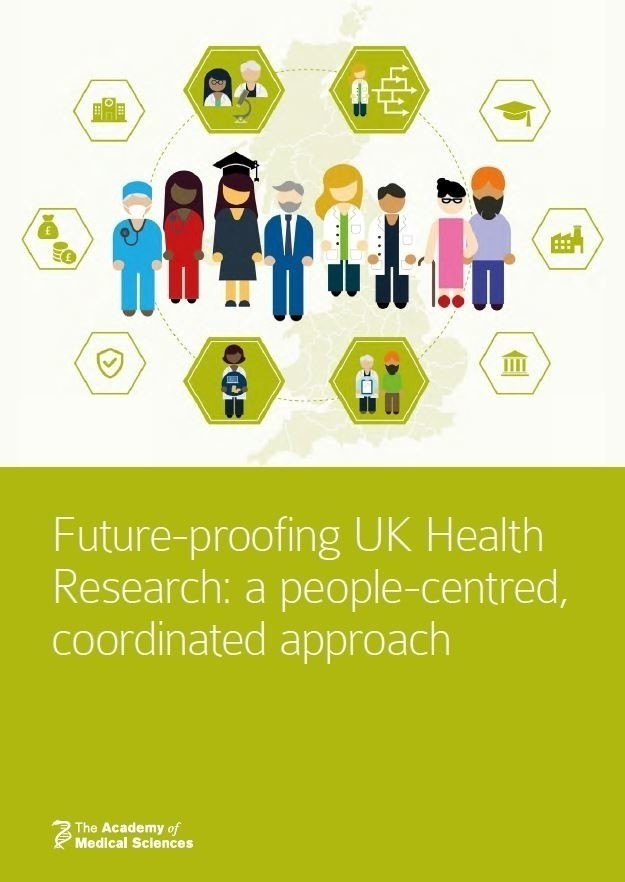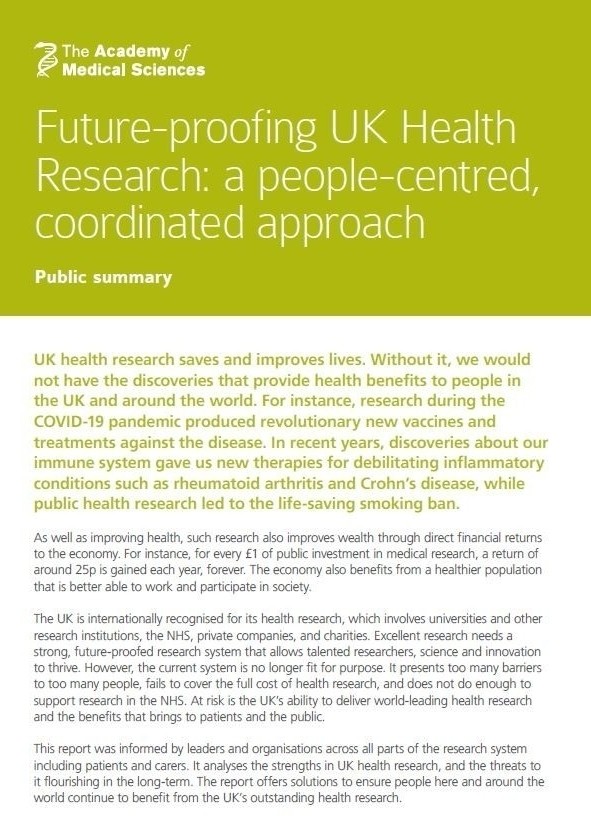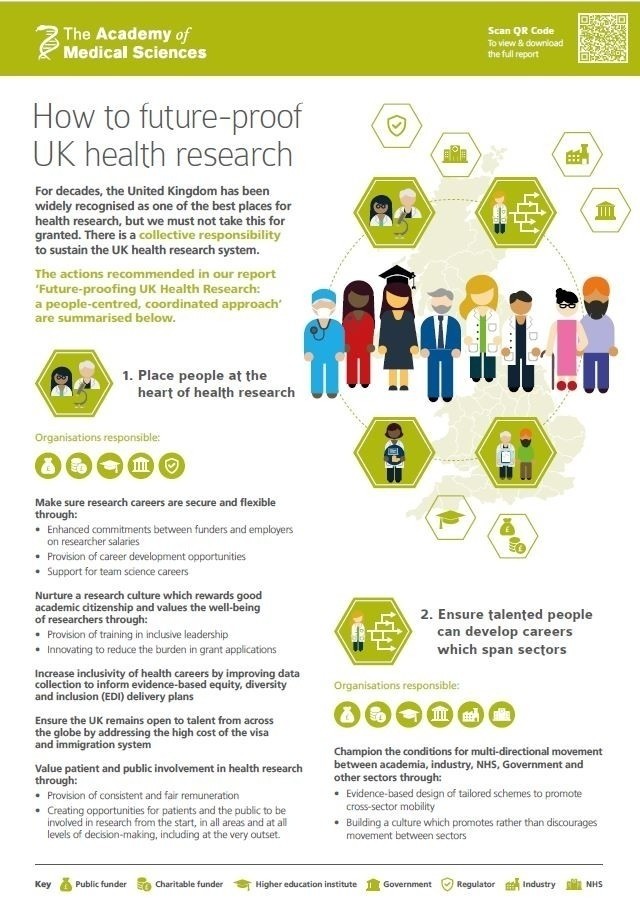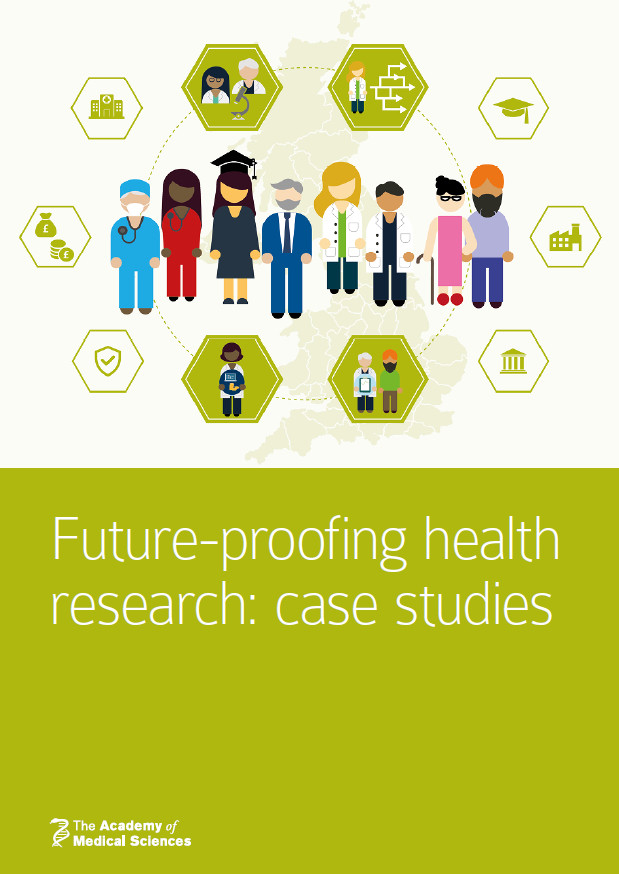The NHS is uniquely placed to be the engine of health research.
“COVID-19 demonstrated how vital research is to the NHS and showed what can be achieved when it is prioritised, highlighting how research must be a core activity for the NHS.” ~ Academy President
Discoveries from NHS research include which drugs do and don't work as treatments for COVID-19, development of penicillin, the invention of MRI scanners, the development of in vitro fertilisation, DNA sequencing and the immunological advances behind organ transplantation. When the NHS turned 70, we celebrated the impact of NHS research and how to realise the vast potential of the NHS for research in the future.
But even before COVID-19, our January 2020 report raised the alarm about NHS staff struggling to find time for research. Only 0.4% of GPs and 0.1% of nursing and midwifery professionals had research as part of their role in 2017. Our report set out a powerful vision to make sure scientific discoveries continue to boost the NHS and improve patient care.
"Protecting and strengthening research is a win-win situation for patients, the NHS, universities and our economy. There is increasing evidence that shows that patients treated in research-active hospitals get better quality of care, even if they are not taking part in a research project." ~ Academy President
In 2022 we also marked the passing of the Health and Care Act. We have worked hard to ensure this Act recognised research as essential to improving the care of patients in the NHS, rather than as an add-on.
“I am delighted to see that our efforts can be seen in the new Act, as now leaders within the NHS are required to ‘actively facilitate’ or otherwise promote research. Integrated Care Boards – organisations with responsibility for NHS functions and budgets – and NHS England will now have to lay out how they plan to promote research, and report on their efforts.
“I am however disappointed that the Act does not include a mandate for the regular publication of current and future NHS staff numbers as this data would help us to plan for the future health and social care workforce, something that the biomedical research community will continue to call for.” ~ Academy President
In 2022, we also responded to the General Medical Council’s (GMC) consultation on their proposed changes to Good Medical Practice. We advocated for GMC’s recognition of the vital role of research in patient care to be maintained in the final version of these professional standards, which will come into effect in January 2024. GMC have a position statement recognising the importance of research for patients and the wider public, and have collaborated with the Conference Of Postgraduate Medical Deans via a UK joint working group to promote research for all.
Clinical academia
In January 2023, the House of Lords’ Science and Technology Committee concluded their inquiry into Clinical academics in the NHS and wrote to the Secretary of State for Health and Social Care with eleven recommendations. The Committee concluded that engagement with research in the NHS can help to mitigate workforce challenges and improve patient outcomes.
The Academy’s Vice-President Clinical, Professor Paul Stewart FMedSci, was invited to give oral evidence to the inquiry, which the Academy supported with a written evidence submission. We evidenced the invaluable asset of clinical research in the UK and highlighted that, while clinical academic careers are attractive and highly sought after, there are critical issues that must be addressed for us to maintain the excellent benefits of clinical research.
International collaboration and mobility is fundamental for good research and innovation. 82% of British adults feel the UK should be competing with other major economies to attract scientists, academics and their support staff to the UK.
Visa costs
The Academy has argued extensively across consultations, legislation and more that the UK's immigration system must be priced in a way that supports the mobility of research staff to and from the UK.
We work with the Royal Society to support Global Talent Visas for researchers with exceptional talent or promise who wish to work in the UK.
But a skilled worker coming to the UK under the Global Talent Visa has to pay considerably more than they would in eleven other leading scientific nations. The total average upfront cost for a Tier 2 skilled worker visa is £8,419, 540% higher than the average cost in other leading scientific nations (£1,316).
Read more in our joint statement on UK visa costs, also available to download from the side of this page.
Salary thresholds
We also work on salary thresholds in the UK immigration system, and their impact on health research staff. We try to ensure thresholds are proportionate to the average salaries paid within biomedical research – recognising the differences between clinical and non-clinical researchers. In 2019, the Presidents of the four UK National Academies wrote to the Home Secretary outlining why a £30,000 salary threshold would be bad for research and innovation. While there is no current review of the thresholds planned, it is important to keep their impacts under review.
We have also worked with the other UK National Academies to emphasise the value of non-EU researchers to the UK, and the importance of maintaining the ability of UK institutions to recruit them alongside existing domestic capacity building, for example when a particular technical expertise is best found in other countries.
There’s more to research than good ideas.
The research environment should bring out the best in everyone. Do your work and life feel balanced? Are your teams inclusive? Are you incentivised to do better research? These things matter, not just for individual researchers, but for the whole research system and its benefits for patients and wider society.
At the Academy we want to ensure:
- UK research is open and accessible to everyone who wants to work in it
- A career in UK research can be healthy and fulfilling as well as successful
- The UK’s research output is of the highest quality
Achieving this requires improvements in our own processes as well as the external environment we operate in.
Team science
Science is increasingly a team effort with researchers joining up across disciplines and geographies. Despite the obvious global benefits, employers and funders need to catch up with new ways of working to make sure that the talented people behind major scientific advances get the credit they deserve. We continue to champion broader recognition and team science, through our landmark 2016 team science report and 2019 follow-up workshop. Read a blog from report chair Professor Dame Anne Ridley FRS FMedSci.
Culture and training
We consistently engage with Government strategies and initiatives which aim to improve the UK's research culture.
- In July 2021 we responded to the Government's People and Culture Strategy.
- In January 2021, we responded to a call for evidence on equity in the STEM workforce. We summarised our ongoing efforts to promote equity and equality in medical science, highlighted key areas which require improvement, and referenced the potential impacts of COVID-19 on equality, diversity and inclusion over the coming months and years.
- In September 2022, we responded to the Lords Science and Technology Committee's consultation on People and skills in UK STEM. We highlighted the importance of improving the diversity of the STEM workforce, identifying skills gaps and ensuring Team science contributions are sufficiently recognised.
The Academy is part of the Clinical Academic Training Forum, which brings together people from across the UK clinical academic training landscape to influence and improve training, research and patient care. This forum, whilst chaired by Academy Vice-President Professor Paul Stewart FMedSci, launched a new training and careers hub for people starting their clinical academic journey. The Clinical Academic Training Forum also co-produced a survey and report exploring the perceptions of academic trainees following changes to medical specialty curricula.
Professor Stewart, in his capacity as CATF Chair, submitted evidence to the Science and Technology Committee’s inquiry into Clinical academics in the NHS. He highlighted where action is needed to improve flexibility and representation in clinical academic training and careers, as well as suggestions for embedding research in the NHS.
As a funder, we support and sign declarations, concordats or joint statements of principle on issues including open access and research integrity and embedding diversity is a priority for our President.
Research reproducibility
We are committed to improving research reproducibility and in 2015 we produced joint report on the challenges and opportunities for progress. As a stakeholder of the UK Reproducibility Network, we work with others to champion robust and reproducible research.
For decades, UK health research has generated sustained health and economic benefits for people here and around the world. The COVID-19 pandemic has again given us cause to celebrate its success but also shone a light on some of its inherent fragilities.
Long-term sustainability of health research
Throughout 2021 and 2022 we brought together experts from academia, industry, charities and the NHS to explore the long-term sustainability of health research in the UK, in terms of both quality and also social/econnomic costs.
On 10 May 2023, we published Future-proofing UK Health Research - a people-centred, coordinated approach.
Produced by 30 experts from across the UK, including established and emerging research leaders, patients, carers and representatives from the public, private and charitable sectors, it details key threats to UK health research and the steps needed to protect it.
COVID-19 and research careers
COVID-19 has caused immense disruption to biomedical and clinical researchers in various forms, with many disproportionate and uneven impacts across careers stages and disciplines. Read our workshop report on the impact of COVID-19 on biomedical research careers and find out more about our ongoing work to support both the researchers we fund and the wider research ecosystem in our COVID-19 hub.
